Dan and Rachel Weeks have launched Adelaide's first craft cannery in Port Adelaide, tinning Eyre Peninsula produce with a focus on low food miles, sustainability and Mediterranean flair.
Little Tin Co reels sustainable seafood into the Port
Little Tin Co originated on the shopless Deal Island in the Bass Strait, where the couple spent three months of COVID-19 isolation in the autumn of 2020 with little more than tinned fish.
With a simmering urge to create a business they were passionate about, the circumstances gave the pair time to reflect.
“We just contemplated how we were surrounded by these beautiful waters and there’s not really any tinned fish that’s of Australian origin,” Rachel says.
“It seems like such a staple but we’re importing it halfway across the world.”

Dan, who’s on the production line while CityMag speaks to Rachel, has spent 10 years on tuna boats and abalone farms in Port Lincoln. The pair now live in Stirling.
“He has that background of the catch,” Rachel says. “Things like sardines [are] potentially going for fish food [for tuna], even though they’re really high-quality fish.”
These local sardines, as well as Hot Smoked Kingfish and Vermouth Pate and Smokey Port Lincoln Mussels with Cape Jaffa Whisky make up the business’s first release.
The Weeks have imported their own single canning machine because “a lot of the commercial canning machines, to really start it up, you need to do 40,000 cans at a time, which is not what we’re about”.
“Everything is put in by hand by a team of probably five to ten people on a production day, and it just does one can at a time,” Rachel says.
“All the sardines are placed in by hand, the mussels are placed in by hand, and the kingfish is piped into the can by hand, so there’s no automation at all.”

The tins are decorated with original designs by local artist and Dan’s mother Ingrid Mangan.
Inspired by the “striking” artwork of companies similar to Little Tin Co in Spain and Portugal, Rachel and Dan particularly admire the animated eyes of Ingrid’s watercolour fish.
Unable to travel to the Mediterranean themselves due to the pandemic, the couple connected with similar businesses there online, read research papers and studied the history of canning to build their brand.
Trial and error meant “developing a recipe and getting it out to friends and family and foodies that we know and asking for their comments and feedback”.
“We just mucked around with quite a few things and found the whisky paired well with the smokiness of the mussels and the vermouth paired well with the fennel seeds and herbs and spices we’ve got in with the kingfish,” Rachel says.
Her favourite way to enjoy the products is “really just as they are”.

“All of it just needs to be on some beautiful rye or fresh toasted bread just with a squeeze of lemon, served with friends,” Rachel says.
Alternatively, she recommends the products as a premium source of protein for hikers, like an Australian version of Patagonia Provisions.
Future goods may be sourced beyond the state – but not the country – as Rachel instils her years of work for sustainability not-for-profits in Little Tin Co.
“We’re looking at using some alternative species that aren’t normally seen or probably haven’t ever been seen in a can before,” she says.
“So really trying to focus on the more abundant species that are maybe less utilised … and working on making those taste delicious as well.”
Little Tin Co products are available in speciality stores or online.




